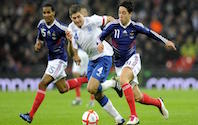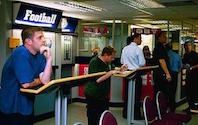How do you improve your performance on online casino games?
Combining probability theory, pattern analysis, and strategic decisions will help improve gaming performances in online casinos, using data and statistics. Here are a few ways to use these concepts. Here is the best gambling sites India.
Understand the House Edge
- House Edge: Each game in a casino has a built-in house edge, which represents the casino's advantage over the player. Understanding the edge of different games can help you choose games where you have a better chance of winning.
- Example: Blackjack typically has a lower house edge (around 0.5% with optimal play) compared to slot machines, which can have a house edge of 2-10%.
- Analyze Historical Data
- Patterns & Trends: Track your gameplay results over time to identify patterns or trends. For instance, in games like poker, analyzing your past hands can reveal which strategies work best.
- Data Tracking: Use software or spreadsheets to log your game outcomes, decisions, and results. Over time, this data can provide insights into your strengths and weaknesses.
- Probability and Odds Calculation
- Odds: Knowing the odds of certain outcomes can guide your decisions. For example, in roulette, knowing the odds of hitting a single number (1 in 37 for European roulette) can influence how you place your bets.
- Expected Value (EV): Calculate the expected value of different bets. This helps you determine which bets are statistically more profitable in the long run.
- Use of Betting Systems
- Martingale, Fibonacci, etc.: Some players use betting systems their bankroll and attempt to minimize losses. While no system can overcome the house edge, they can help in managing risk. Please read terms and condition of each casino as many do not allow players using this system.
- Simulation: Run simulations of different betting systems using historical data to understand their long-term viability.
- Game-Specific Strategies
- Blackjack: Card counting is a strategy that uses statistical data to determine the likelihood of certain cards appearing. By keeping track of the cards that have been played, you can make more informed decisions.
- Poker: Analyzing hand histories and opponent tendencies can give you a statistical edge over your opponents.
- Bankroll Management
- Risk Management: Use statistical models to determine the optimal amount to bet in each game. Kelly Criterion is one such formula that can help you maximize your bankroll growth while minimizing risk.
- Variance: Understand the concept of variance and how it affects your short-term results. Proper bankroll management helps you withstand the ups and downs of casino games.
- Use of Software Tools
- Tracking Software: Use poker tracking software, to analyze your performance and adjust your strategy accordingly.
- Simulations: Run Monte Carlo simulations to model the potential outcomes of different strategies and bets.
- Behavioral Analysis
- Player Profiling: In games like poker, analyzing other players' tendencies can give you a statistical edge.
- Your Own Behavior: Track your emotional responses and betting patterns to avoid making irrational decisions under stress.
- Stay Updated with Game Rules
- Rule Variations: Stay informed about the specific rules and payout structures of the online casino games you're playing. Different rules can significantly impact the house edge and your strategy.
- Practice and Learning
- Simulation Practice: Use free online versions of casino games to practice and refine your strategies without risking real money.
- Continuous Learning: Stay updated with the latest strategies, statistical analysis techniques, and software tools in the gambling community.
With these approaches combined, you should be able to make better-informed decisions, lessen the effects of luck, and perhaps up your chances of winning at online casino games.
What historical data is there on probability?
The historical data regarding probability dates back to many games, gambling techniques, and scientific studies applied over the centuries. Here is an overview of the key developments and sources proud to have historical probability input:
Early Gambling Practices
- Ancient Civilizations: The earliest records of gambling and games of chance date back to ancient civilizations like the Egyptians, Greeks, and Romans. They used dice, knucklebones, and other objects to determine outcomes. These practices laid the groundwork for understanding probability, even if not formally recognized.
- Chinese Lotteries: Ancient China had a rich history of lotteries and gambling, including keno, a lottery-like game. These practices contributed to the study of probability, especially in understanding random outcomes.
Development of Probability Theory
- Gerolamo Cardano (16th Century): An Italian mathematician who is often credited with being one of the first to formally study probability. He wrote "Liber de Ludo Aleae" (Book on Games of Chance), which discussed the mathematics of gambling and introduced concepts like the probability of certain outcomes in dice games.
- Pierre de Fermat and Blaise Pascal (17th Century): These French mathematicians exchanged letters that laid the foundation for modern probability theory. Their work on problems such as the "problem of points" (how to divide stakes in an interrupted game) helped formalize the rules of probability.
The Law of Large Numbers
- Jacob Bernoulli (Late 17th Century): A Swiss mathematician who formulated the Law of Large Numbers, which states that as the number of trials in a random event increases, the average of the results obtained will be closer to the expected value. This law is fundamental to understanding probability and long-term outcomes in games of chance.
Statistical Data in Gambling
- Roulette: Extensive historical data has been collected on the outcomes of roulette games, particularly in the 18th and 19th centuries. This data has been used to study the distribution of numbers and the fairness of wheels.
- Blackjack: In the mid-20th century, Edward O. Thorp used probability and statistical analysis to develop the first card-counting system in blackjack, which was published in his book "Beat the Dealer" (1962). This marked a significant application of historical data and probability theory in gambling.
Monte Carlo Method (20th Century)
- Simulation and Computation: The Monte Carlo method, developed during the 1940s, uses random sampling and statistical modeling to estimate complex probabilities. It has been applied in gambling to simulate games and assess strategies, providing a wealth of historical data on probabilities in various scenarios.
Poker and Game Theory
- John von Neumann and Oskar Morgenstern (20th Century): Their work on game theory, particularly in poker, revolutionized the understanding of strategic decision-making in games of chance. Historical data on poker hands, outcomes, and strategies has been extensively studied and used to refine probability calculations in the game.
Modern Data Collection
- Casino and Online Game Data: In modern times, casinos and online gambling platforms collect vast amounts of data on game outcomes, player behavior, and betting patterns. This data is used to refine algorithms, improve game fairness, and understand player tendencies. The availability of large datasets has allowed for more precise calculations of probability in various games.
Sports Betting
- Historical Odds and Results: Sports betting relies heavily on historical data of game outcomes, player statistics, and odds. This data is used to create models that predict future outcomes and set betting lines.
Financial Markets
- Stock Market and Probability: The development of probabilistic models in financial markets, like the Black-Scholes model, has parallels to gambling and betting. Historical data on stock prices, options, and market behavior is used to predict future movements, much like in gambling.
Academic Research
- Studies and Publications: Numerous academic papers and books have been published on the application of probability theory in gambling. These works often include historical data and case studies that illustrate the principles of probability in action.
The historical data concerning probability is vast and varied, mostly including gambling, mathematical findings over hundreds of years, and modern computational methods. It is mainly important when speaking of probability in gambling, along with finance and decision-making.
What about the data probability for slots?
The probability data for slots is massively influenced by the machine's RNG, RTP, hit frequency, and volatility. By understanding these factors, and with reference to some historical data, players can better inform themselves regarding which machines to be playing at and what sort of things to expect from them. However, players must remember that every spin is independent and that no amount of historical data can ever predict the outcome of a specific spin. The author will always be looking at the different aspects of the machine in a very careful way and deliver the best suggestions for the players.








































